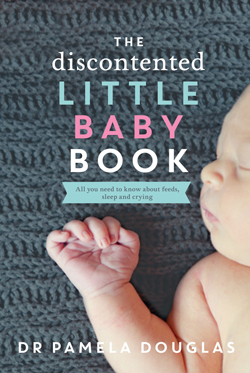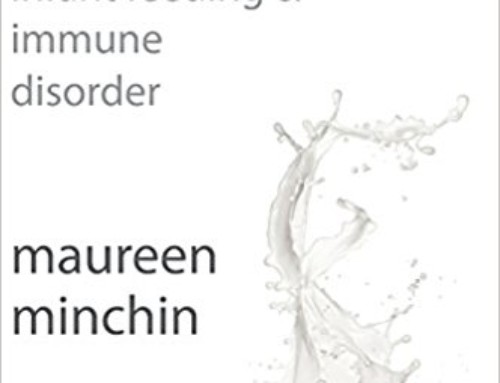 I have to start this review with an apology. I received this book a while ago and had fully intended on reviewing it in October. Then the proverbial sh!t hit the fan in my personal life and everything got pushed aside. I was finally able to start reading this over the holidays and can write up on it now. Why apologize? Because this means there has been three months in which people may not have been buying and reading this book. That’s a lot of people that potentially may have avoided cry-it-out and scheduled feeds, people that may have been anxious about all things to do with newborn feeding and sleeping, people who have shut themselves away under the misguided notion that babies need strict schedules. So I’m sorry.
I have to start this review with an apology. I received this book a while ago and had fully intended on reviewing it in October. Then the proverbial sh!t hit the fan in my personal life and everything got pushed aside. I was finally able to start reading this over the holidays and can write up on it now. Why apologize? Because this means there has been three months in which people may not have been buying and reading this book. That’s a lot of people that potentially may have avoided cry-it-out and scheduled feeds, people that may have been anxious about all things to do with newborn feeding and sleeping, people who have shut themselves away under the misguided notion that babies need strict schedules. So I’m sorry.
For those of you who like quick reviews, let me say this: This is by far one of the best books I have ever read for new parents. It is fabulous. All the things I rant about, like people thinking sleep problems require sleep fixings when really they’re often feeding or other issues or how nursing to sleep is good or how strict schedules are not necessary, are all covered in detail in this book. Buy it. Read it. Love it. Then share it with another new mom.
Done.
Now the longer version…
I want to start with who Dr. Pamela Douglas is because some of you will recognize the name, many won’t. She’s a general practitioner (doctor), IBCLC, and researcher based in Australia. She runs a clinic (Possums Education and Possums for Mothers and Babies) and conducts research at the University of Queensland. I highlighted one of her review papers here on EP when she conducted a full review of the studies of sleep training in the first six months of life, highlighting the risks associated with early sleep training (you can read that here). She is a huge advocate for cue-based care and the promotion of breastfeeding (though she accepts every family’s decision in how to feed their child but sees many of the booby traps women face and works to end these so women who want to breastfeed, can).
This book is an accumulation of nearly three decades of medical practice and research as well as her own personal experiences as a mother. To say it’s amazing is an understatement.
The book focuses on the three main issues that plague new parents (and sometimes repeat parents): Feeding, sleeping, and mom’s mental health. Unfortunately so many people treat these issues as independent from each other when they are so very intertwined. For example, a baby who isn’t feeding well is more likely to be unsettled sleep wise and a mother who is using a strict schedule and worried about baby’s sleep is less likely to be social and more likely to be highly anxious and thus suffer mental health problems.
Through her years in practice as a doctor, Dr. Douglas knows that when parents complain about their babies not sleeping well, it’s nearly always as issue with feeding (with exceptions for prematurity, health conditions, etc.) and yet the common approach has been to switch to formula and sleep train. Although this may solve some problems, as she points out in her book, sleep training often doesn’t work long term (with most parents have to repeat it, something borne out in research published last year on the use of modified extinction sleep training) and can cause greater anxiety in parents. She argues that the schedules and training that we’ve instilled parents to think is “necessary” only serves to undermine parents’ understanding of their child’s cues, breaking down the synchrony between them and resulting in even more anxious parents who require clocks to feel any sense of security. She talks about nursing on demand, nursing to sleep, and bedsharing in scientific and historical contexts.
As an ICBLC she knows all of the various ways in which breastfeeding can be going wrong and describes these in such detail that many moms reading may not even have to book that appointment for help. As a researcher, she also knows the value in making sure new parents stay social, get outside, and focus on their own mental health as well. In this, she bucks all “popular” advice to put baby to a strict schedule, make sure baby naps at home, and so on. Instead, she advocates naps on the go (after all, babies will sleep when tired enough if there are no medical conditions preventing issues) and making sure mom or dad take care of their own mental health.
The overarching goal of this book is to calm parents and it does a wonderful job of that. The information is easily digestible, logical, and filled with anecdotes so readers know they aren’t alone in the problems they face. I like to imagine what a society would look like if every new parent read this book (along with some others that I love). I do believe we’d see a dramatic shift in the treatment of babies and the overall happiness parents would have in their role.
But that’s not all…
This wonderful book for parents should also be a must-read for other family doctors or anyone who works with parents and babies. First there is the issue of the information in it. If all caregivers had this information then we would hopefully see an end to the various pieces of advice that sabotage breastfeeding relationships, that tell parents they need to sleep train or stop bedsharing, and so on. However, it’s more than that.
In the anecdotes, Dr. Douglas does such a wonderful job of showing how one should speak to someone facing a crisis or concern with their child that it’s a lesson in empathy, communication, and tact that all people can learn from. Through years of practice, she has mastered the art of conveying her information in ways that don’t threaten or put a new parent on the defensive. She speaks from the heart, with all the information a parent needs, but the suggestions are subtle and done without judgment or even “need”. By that, I mean that she’s always open to what parents want to do. She’ll suggest something else, but reminds parents, if it doesn’t work for them, they can always go back to what they’re doing (even though most are there reporting it’s not working, like most people, many of them still are reluctant to change). She made me wish she was my doctor (and that’s saying something as my doctor has been super supportive of breastfeeding and everything).
All in all, I can’t recommend this book highly enough. For parents, it’s the wisdom and information you need in the first year of your baby’s life. For caregivers, it’s a wonderful guide to improving your relationships with your patients by listening to them and being able to communicate in an effective and respectful manner.
So go buy it.
You can purchase The Discontented Little Baby Book by clicking on the link below.






Thanks for the review! I’m always on the look-out for new parenting books, especially if they calm and support rather than stress and worry. I’ve recently been thinking about our society’s obsession with routines for babies and look forward to reading her take on it.
This book sounds amazing! Thanks for sharing. I read the description on Amazon though and it made it sound like it’s geared towards the first 16 weeks of baby’s life. My daughter is 5 months. Do you think it is still helpful for older babies? There’s no chapter index provided, so I can’t get a closer glimpse of the content to see if that’s the case or not.
I would say still relevant 🙂
Thanks for your review, Tracy. I am lucky enough to have been a client of Pam Douglas and can vouch that she is a wonderful doctor and woman. I was referred to her by the lactation consultants at my maternity hospital as one of the two GPs in Brisbane that could release my newborn son’s tongue-tie. Asher had been unable to latch onto the breast since birth. The added grief of not being able to breastfeed my son after also experiencing an emergency caesarian section, rather than the natural birth I had hoped and planned for, was just heartbreaking.
Pam rearranged her schedule to ensure she could see us as soon as possible. I thought she would just release Asher’s tongue tie and send us on our way. But that was not the case. Pam gave me the most thorough and wholistic health checkup I have ever had, and monitored my health closely for the next few weeks until all issues were resolved. Critically, she also ensured that my son and I had the support we needed to establish breastfeeding. Those early weeks were very difficult and I can attest to Pam’s knowledge, experience and very importantly, her empathy for us.
My son is now 2 1/2 years old and is still enjoying breastfeeding. Without Pam’s help in those first weeks of Asher’s life, (and the help of the Australian Breastfeeding Association thereafter) we would have missed out on something that was just so important to us and our relationship. And for that, I will be eternally grateful to her.
On your recommendation, I got the book out of the library and have just finished it. Will definitely get a copy as I work a lot with mums with young babies and sleep is a big issue that comes up over and over. As a La Leche League Leader and also someone who believes wholeheartedly in attuned parenting I find so many books on sleep either downright unhelpful and even harmful. I follow your work closely as I know I can trust what you say. I find Pam’s approach protects and promotes breastfeeding and also offer helpful insight into sleep that I have not seen in other books. Now next to this book on the shelves at the library, there was another – The Happy Sleeper by Heather Turgeon and Julie Wright. It claims to be a science backed guide to sleep and has a foreword by Dan Siegel. I got it because I have read Dan Siegal and like what he says. However just a few pages in and I am doubting the book hugely – just wondered whether you have read it and what your opinion is.
Ta and keep doing what you are doing – there are many relying on your work awesome lady!
I haven’t read it. What are the things that are making you doubt it? I’m very curious as having Dan Siegel do the forward, one would expect better!
The Happy Sleeper.. describes itself this way
Many parents feel pressured to “train” babies and young children to sleep. But kids don’t need to be trained to sleep—they’re built to sleep. Sleep issues arise when parents (with the best of intentions) overhelp or “helicopter parent” at night—overshadowing their baby’s innate biological ability to sleep well. In The Happy Sleeper, child sleep experts Heather Turgeon and Julie Wright show parents how to be sensitive and nurturing, but also clear and structured so that babies and young children develop the self-soothing skills they need in order to:
– Fall asleep independently
– Sleep through the night
– Take healthy naps
– Grow into natural, optimal sleep patterns for day and night
The Happy Sleeper is a research-based guide to helping children do what comes naturally—sleep through the night.”
So many red flags there for me!
Oh yes, HUGE red flags there. Wonder if Dr. Siegel actually read it before doing the forward.
Yes, I wondered that and would be disappointed if he did and still endorsed it. The scary thing is they claim to be research-based and gentle and I know so many parents will go for this.
Thank you for recommending this book! I went straight to the Kobo store (not out in print in Canada til April) and devoured the book in a few days. My daughter was 11 weeks when I started it, and I found the whole thing illuminating not only as a new mom but as a healthcare professional. I was struck by the fantastic approach that Dr Douglas uses when communicating with her patients. She seems so great at recognizing women and families capacities and really listening to them. I can’t stop talking about this book to my friends and family. This book has helped me to trust my instincts in what my baby needs, not to mention learning a lot about the sleep homeostat, circadian rhythms, the myth of the over stimulated baby, and sympathetic/parasympathetic nervous system. Honestly I am just ecstatic with this book. Thanks again for the suggestion and rave review!
Best, Nina.
PS Next looking to get the Gentle Sleep Book that you just mentioned….
I’m so happy to hear you loved it as much as I did! I feel confident you’ll love the Gentle Sleep Book too 😉
[…] Practitioner, Pamela Douglas. It’s called ‘The Discontented Little Baby Book.’ (Here is a great review by Evolutionary Parenting). This book is an accumulation of nearly three decades […]
Thanks for the review! I am ordering it today. I am an IBCLC and my newest little grand baby is a bit fussy. (our third G’baby, but first to this daughter) In going over the Gestalt method, I learned of this book. This sweet precious little baby just seems to be fussy. It seems unrelated to moms diet. Breastfeeding is going well and the laid back positioning appears to be helping my daughter achieve a more relaxed breastfeeding position. The fussiness is at different parts of the day, and she just seems unsettled – no matter what we do. Last night I found Dr. Harvey Karps methods seemed to help a lot – which makes me think its just a normal neurological fussiness that she will outgrow … but I’m looking forward to reading this book and learning more!